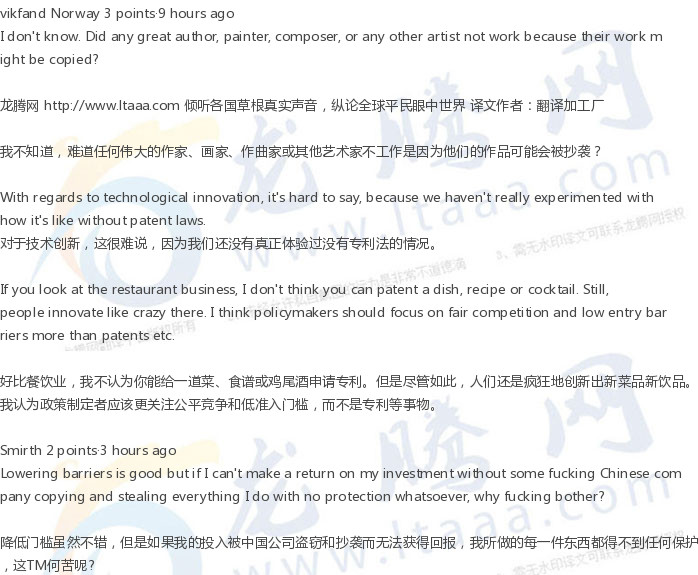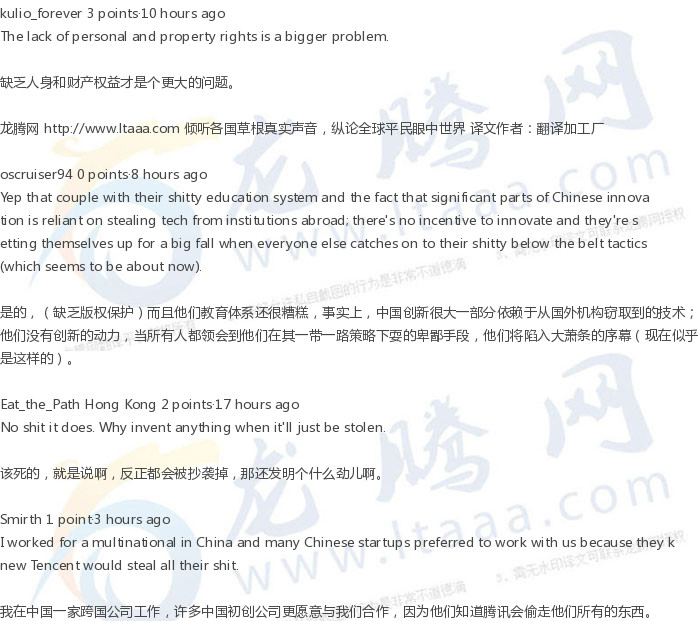你们认为缺少版权保护会影响到创新吗? [美国媒体]
你是愿意在研究与开发上花钱,即使知道会被抄袭,还是等别人开发出来然后抄袭他们的就好?
每人一小段,翻译我也行!
每日新素材,等你来认领! http://www.ltaaa.com/translation.html
-------------译者:龙腾翻译总管-审核者:龙腾翻译总管------------
Posted byu/FomalhautV Canada 17 hours ago
Why would you spend the money on r&d if know it's going to be copied and why not just wait for others to develop and copy them?
你是愿意在研究与开发上花钱,即使知道会被抄袭,还是等别人开发出来然后抄袭他们的就好?
-------------译者:左紫月-审核者:龙腾翻译总管------------
HotNatured United States 9 points·17 hours ago
The stated aim of intellectual property law is to promote authorship and innovation. As to whether that happens in practice, it's difficult to say. There's a lot of frivolous lawsuits which weigh down the courts and this can certainly hinder innovation in some ways.
知识产权法的目的是促进原作者的创新和创作。至于这个有没有在实践中产生效果,很难说。有很多无意义的诉讼拖累了法院,这肯定会在某些方面阻碍创新。
So, yeah, there's an impact. As for the valence thereof -- well, there appears to be some uncertainty.
嗯,所以,这是有影响的。至于它的机理——嗯,感觉有些不确定性。
IkePAnderson 4 points·8 hours ago
There are several cases where the lack of copyright protection actually increases innovation. For example this episode of the asheashes podcast talks about James Watt's steam engine, which was useful and worked well while it was patented, but once the patent was up people were finally able to take the design and improve on it / combine it with other technologies.
在一些案例中,缺少版权保护实际上增加了创新。例如,这个播客在这集中谈到了詹姆斯·瓦特的蒸汽机,这台蒸汽机在申请专利时很有用,而且运行良好。但等到专利保护失效,人们终于能采用这种设计并对其进行改进或将它与其他技术结合起来。
FomalhautV Canada 2 points·7 hours ago(贴主)
That I agree with. Only problem I see is greed and politics getting in the way of drawing the line, which technology to open source, vice versa.
这我同意。我所看到的唯一的问题是贪婪和政治阻碍了我们去划定哪些技术应该开源,哪些技术应该保密的界限。
Smirth 2 points·3 hours ago
That's exactly why patents are for 20 years. Too long and they stifle further innovation. Too short and they stifle investment.
这就是专利有效期为20年的原因。时间过长,就会扼杀进一步的创新。太短会扼杀投资(收入)。
-------------译者:C先生-审核者:龙腾翻译总管------------
Scope72 3 points·17 hours ago
Well intuitively it would seem so. But it would likely be more at a societal level. Over time the people in a society that rewards inventors will develop a faith in the system. Theoretically this should drive the culture towards having a certain percentage that take risks. Risks that might not have happened otherwise. But I don't think you can just switch on the law and see it instantly happen. It likely takes time.
从直觉上看起来是这样的,但这可能更多的是在社会层面上。在一个奖励发明者的社会,时间久了,人们就会在这个体系里重拾信心。从理论上讲,这可能会使文化承担一定的风险。承担本可能不会发生的风险。但我不认为法律的实行就像扭动开关按钮一样,一扭开就会立即生效。这是需要时间的。
But I don't know of any studies showing either way.
但我不知道有哪个研究证明了这两种方式。
Bucknakedbodysurfer 1 point·11 hours ago
yes.
我认为会。
Tren-Bot 1 point·6 hours ago
New Bailun baby
看看新百伦,宝贝你就明白了。
Sparkykun 1 point·20 minutes ago
An education system that stresses the importance of memorizing facts and learning from others over searching for truths for oneself is a big factor in clamping down on innovation and "out of the box" thinking. Copyright protection and patents just work to offer a monetary incentive protect the inventor and make sure the technical know-how are eventually publicized instead of kept in the dark as a family secret.
一个更强调死记硬背和向他人学习的重要性,而不重视自己寻找真理的教育体系,是压制创新和“开箱即用”思维的一个重要因素。版权保护和专利的作用是提供金钱激励,保护发明者,并确保技术知识最终被公开,而不是当做家庭秘密那样被隐瞒起来。
版权声明
我们致力于传递世界各地老百姓最真实、最直接、最详尽的对中国的看法
【版权与免责声明】如发现内容存在版权问题,烦请提供相关信息发邮件,
我们将及时沟通与处理。本站内容除非来源注明五毛网,否则均为网友转载,涉及言论、版权与本站无关。
本文仅代表作者观点,不代表本站立场。
本文来自网络,如有侵权及时联系本网站。
图文文章RECOMMEND
热门文章HOT NEWS
-
1
Why do most people who have a positive view of China have been to ...
- 2
- 3
- 4
- 5
- 6
- 7
- 8
- 9
- 10
推荐文章HOT NEWS
-
1
Why do most people who have a positive view of China have been to ...
- 2
- 3
- 4
- 5
- 6
- 7
- 8
- 9
- 10













